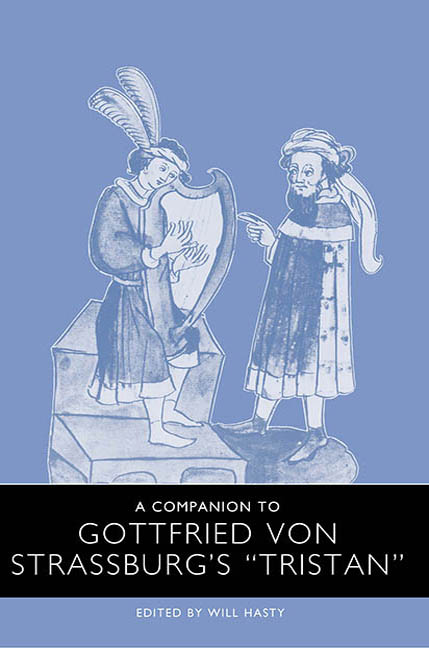Book contents
- Frontmatter
- Contents
- Acknowledgments
- Introduction: The Challenge of Gottfried's Tristan
- I Cultural and Social Contexts
- II Figures, Themes, Episodes
- III Gottfried's Narrative Art
- Between Epic and Lyric Poetry: The Originality of Gottfried's Tristan
- History, Fable and Love: Gottfried, Thomas, and the Matter of Britain
- IV The Medieval and Modern Reception of Gottfried's Tristan
- Notes on the Contributors
- Index
Between Epic and Lyric Poetry: The Originality of Gottfried's Tristan
from III - Gottfried's Narrative Art
Published online by Cambridge University Press: 28 April 2017
- Frontmatter
- Contents
- Acknowledgments
- Introduction: The Challenge of Gottfried's Tristan
- I Cultural and Social Contexts
- II Figures, Themes, Episodes
- III Gottfried's Narrative Art
- Between Epic and Lyric Poetry: The Originality of Gottfried's Tristan
- History, Fable and Love: Gottfried, Thomas, and the Matter of Britain
- IV The Medieval and Modern Reception of Gottfried's Tristan
- Notes on the Contributors
- Index
Summary
Texts belonging to the epic genre are per definitionem narrative texts. This is true of antique epics such as Homer's Iliad and Odyssey and Virgil's Aeneid, it is true of medieval heroic epics such as the Chanson de Roland and the Nibelungenlied, and it is also true of the medieval romances, especially the French Arthurian romances along with their German reworkings. The romances, however, manifest a significant new feature: the story is no longer sung, but rather in all likelihood presented without music. The role of the music has thus been taken over in the romances by verse, prior to the transition to prose that occurs later in the Middle Ages. The narration of events, whether historical or fictional in their origin, is of paramount importance in the romances. We are supposed to be interested primarily in the manner in which figures are characterized, the nature of the relationships among them, the situations that result from these relationships, etc. This is not to say that narration rests exclusively in the development of plot. There are also pauses in which the narrator communicates his opinion about important aspects of the narrated events and articulates general considerations of different kinds, whether philosophical, moral, or didactic, that are relevant to these events. There are other pauses in which the situation of the figures is depicted with great depth of feeling, either by the narrator or by the figures themselves, in such a way that the narration becomes something close to song. In the latter case we may speak of lyrical passages. Such passages can already be found in Virgil's Aeneid, when Dido expresses her loyalty to her dead husband Sychaeus, the temptation of a new love (for Aeneas), and later her rage and despair when she learns of Aeneas's plans to leave her. To be sure, these emotions contribute decisively to the development of the plot, so that one can scarcely speak of “pauses.” In the Arthurian romances in Germany one finds similar moments, for example in Hartmann von Aue's Iwein (an adaptation of Chrétien de Troyes's Yvain), when the hero is deeply moved by the beauty of the young widow whose husband he has just killed in combat (1610–90).
- Type
- Chapter
- Information
- A Companion to Gottfried von Strassburg's Tristan , pp. 205 - 222Publisher: Boydell & BrewerPrint publication year: 2003

